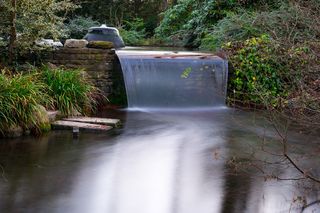Mindfulness
How to Be in the Flow
Being in the flow of your life might be all about mind-set.
Posted March 13, 2017
Last week during my annual retreat to Maui, I thought a great deal about the importance of living in the flow of life. It’s easier to think about concepts such as flow in places like Maui, a place I consider my sanctuary, and where I go to recharge my batteries. It is, after all, a paradise of sorts, and the land of aloha.
Detachment from the reality of our normal daily routines has become more and more difficult, especially in view of our seemingly unbreakable connection to modern technology, but at the same time, separation is so essential for our mental well-being.
As much as I vowed to leave my cell phone in my hotel drawer when I was out and about in Hawaii, I realized that since my camera is part of my cell phone, leaving it behind wasn’t realistic. So instead of detaching from the device, I tried to detach myself from reading the influx of non-urgent e-mail messages I received. I did so by shutting off the notifications for my e-mails and text messages, which allowed me to practice living in the flow of the moment. If you pick up any magazine in Hawaii, the first thing you’ll notice are the numerous articles and advertisements on how to be mindful, which means being present in the moment without thinking too far ahead or being obsessed by the past.
In addition to being a good practice, mindfulness and going with the flow means accepting what is happening in the now and not trying to manipulate or change situations. The Hawaiian mind-set is to sit back and allow things to unfold as they’re meant to. If you sit back and just allow things to happen, you will not only be going with the flow, but you’ll also be surprised by how everything falls into place in a less stressful manner. Another amazing thing about living in the flow is that it’s contagious. You’ll find that your friends and family will catch on quickly and adopt the same attitudes.
Mihalyi Csikszentmihalyi is one of the pioneers on the research of flow. His initial studies involved creative individuals, but his concepts actually apply to all aspects of life. In his book Flow (1990), he describes flow as being consciously in inner harmony with whatever you’re doing. He contends that happiness connects to our ability to feel flow in our lives and that it must be cultivated and practiced. At times, however, flow occurs by chance when certain experiences converge. For example, you might be at a dinner party and strike up a conversation with someone and find that you have a common interest, which leads you to get together for lunch, which turns into a joint business venture. This is a merging of action and a state of awareness. Being open-minded and being a good listener is an important aspect of being in the flow.
The sense of flow is also connected to the release of endorphins that can lead to an intense state of concentration during writing. I have often experienced this state when working on long book projects. When my writing is going well, it seems as if I have entered a trance-like state. In fact, sometimes I have no idea where the time goes, but I look up and realize that all I’ve done all day is sit at my computer and write. One symptom of being in the flow is losing track of time. It feels as if you’re floating and sinking into the moment. It’s not a state you can force yourself to experience, but it’s certainly one that needs to be nurtured.
Some ways to get into the flow:
Be mindful and remain in the moment, whether in a personal or professional setting.
- Take a break from technology, such as cell phones, computers, and TVs.
- Find something that brings you pleasure and concentrate on it.
- Enjoy the journey of your project, work, or conversation, rather than thinking about the destination or final product.
- Refrain from attaching yourself to negative thoughts.
- Stay in a situation or with a project until you feel in your heart that it’s finished.
And, when you do eventually feel as if you’re in the flow, I recommend journaling about what you’re feeling.



